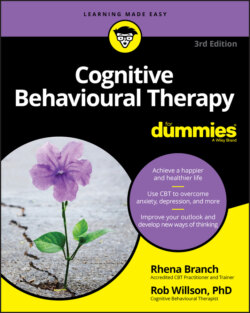Читать книгу Cognitive Behavioural Therapy For Dummies - Rob Willson - Страница 5
List of Illustrations
Оглавление1 Chapter 1FIGURE 1-1: A is the activating event, B is your beliefs and thoughts and C is ...
2 Chapter 2FIGURE 2-1: Catastrophising.FIGURE 2-2: All-or-nothing thinking.FIGURE 2-3: Fortune-telling.FIGURE 2-4: Mind-reading.FIGURE 2-5: Emotional reasoning.FIGURE 2-6: Overgeneralising.FIGURE 2-7: Labelling.FIGURE 2-8: Demands.FIGURE 2-9: Mental filtering.FIGURE 2-10: Disqualifying the positive.FIGURE 2-11: Low frustration tolerance.FIGURE 2-12: Personalising.
3 Chapter 3FIGURE 3-1: The ABC form I.FIGURE 3-2: An example of a filled-in ABC Form II.
4 Chapter 4FIGURE 4-1: Photocopy and fill in your own Behavioural Experiment Record Sheet....
5 Chapter 6FIGURE 6-1: The anatomy of emotion.FIGURE 6-2: Notice the similarities in your physical sensations.
6 Chapter 7FIGURE 7-1: A vicious flower of panic.
7 Chapter 8FIGURE 8-1: The Problem-and-Goal Sheet.
8 Chapter 9FIGURE 9-1: Common physical sensations of anxiety.FIGURE 9-2: Your anxiety reduces with each exposure to a feared trigger.
9 Chapter 10FIGURE 10-1: Jack’s Pricing-up Addiction form.FIGURE 10-2: Percy’s Pricing up Addiction form.FIGURE 10-3: Kelly’s ‘What does my addiction do for me?’ analysis.
10 Chapter 11FIGURE 11-1: The amount of emphasis people with unhealthy body image assume oth...FIGURE 11-2: A more accurate measure of the components of attractiveness.
11 Chapter 12FIGURE 12-1: The cycle of depression.
12 Chapter 14FIGURE 14-1: The starting point for your responsibility pie chart.FIGURE 14-2: Theresa’s responsibility pie chart.
13 Chapter 15FIGURE 15-1: Which do you see first: the big I or all the little is?
14 Chapter 18FIGURE 18-1: The core beliefs dartboard and Beth’s dartboard, showing the three...FIGURE 18-2: The prejudice model illustrates how you sometimes distort positive...FIGURE 18-3: Make a formulation of your beliefs with the help of this form.
15 Chapter 19FIGURE 19-1: Sly’s completed zigzag form.
